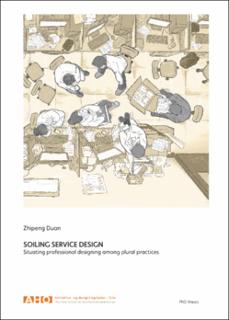| dc.description.abstract | Since the 1990s, professional service design knowledge has travelled globally, detached from its larger Western history and contexts. The proliferation of service design knowledge shapes how individual designers enact their craft locally. However, the dissemination of professional knowledge has remained highly abstract, making it challenging for designers to grasp the underlying perspectives and debates associated with it. Against this backdrop, this doctoral study explores the intricate relationships between individual service designers and the contexts they must navigate. Specifically, it aims to illuminate the complications faced by servicedesigners when striving to establish genuine and meaningful connections between their professional practice and the local contexts in which they work. This study articulates and addresses the constraints that professional knowledge places on service designers when they attempt to situate their practice within local contexts.
Drawing on practice theories, particularly material semiotics, this inquiry is conducted under an experimental program called “soiling service design”. This study recognises that the potential values and harms of a service design practice reside in the specificities of the situation. Knowing and doing contextual service design needs to carefully tackle the messy and meaningful lived context – the soil – rather than rashly washing it away. Employing multiple research methods, the program is unfolded through two experimental clusters: 1) Probing the neatness of narrative, and 2) Weaving service design into the lived context.
The contributions of this thesis are twofold. Firstly, the study elaborates on the detached views held by service designers which restrain them from situating their practices. Such views condition how designers perceive their connection to the world and lead to the potential for a sense of meaninglessness. The value of explicating the detached views is not to offer a comprehensive explanation, but to facilitate practitioners to sensitise their unarticulated perceptions and emotions in doing service design. Their perceptions are a crucial grip to understand the social condition of situated service design practices. Secondly, this study draws out an alternative possibility of relating professional design to local contexts. By proposing various ways of doing and knowing as means to attend to relational practices, the thesis suggests the ability to situate design practice can be cultivated through attentiveness to what others do. Design practice does not necessarily form an inherent-coherent process, but rather entangles with other practices so that the conditions of each other's existence are reciprocally constituted. Messy encounters soil the established understanding of service design. Appreciating the encounters aids individual designers in finding means for determining how they can participate in an ongoing process of worldmaking. | en_US |
